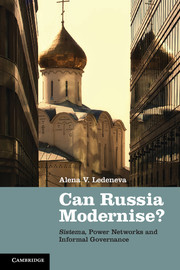Book contents
- Frontmatter
- Contents
- List of figures
- List of tables
- List of boxes
- Acknowledgements
- List of abbreviations and acronyms
- Introduction: modernising sistema
- 1 What is sistema?
- 2 Putin's sistema: svoi on top
- 3 The inner workings of sistema: from blat to otkat
- 4 Sistema's material culture: from vertushka to Vertu
- 5 ‘Telephone justice’ in the global age: from commands to signals
- 6 ‘Werewolves in epaulets’: from doublethink to doubledeed
- 7 From dealership to leadership: sistema and informal governance
- Conclusion
- Appendix 1 Survey questions
- Appendix 2 Interview questions
- Appendix 3 List of interviews
- Glossary
- Bibliography
- Index
- References
4 - Sistema's material culture: from vertushka to Vertu
Published online by Cambridge University Press: 05 February 2013
- Frontmatter
- Contents
- List of figures
- List of tables
- List of boxes
- Acknowledgements
- List of abbreviations and acronyms
- Introduction: modernising sistema
- 1 What is sistema?
- 2 Putin's sistema: svoi on top
- 3 The inner workings of sistema: from blat to otkat
- 4 Sistema's material culture: from vertushka to Vertu
- 5 ‘Telephone justice’ in the global age: from commands to signals
- 6 ‘Werewolves in epaulets’: from doublethink to doubledeed
- 7 From dealership to leadership: sistema and informal governance
- Conclusion
- Appendix 1 Survey questions
- Appendix 2 Interview questions
- Appendix 3 List of interviews
- Glossary
- Bibliography
- Index
- References
Summary
‘One searches in vain for a book that gets the story right’, sighs a senior Kremlin official:
In 2005 I went to Moscow's biggest bookshop to browse for books in the politics and history department. I looked at what was written about us. As an insider, I knew how the things were and wanted to see how they were interpreted. I was shocked! Books covered every angle: kind, evil, clever, silly. I looked through piles of them, but none of them had got it even close. What I saw was that people wrote categorically about things they could not possibly know about. For example: ‘Kasianov came to Putin and said:…Putin replied:…Kasianov objected.’ Was the author there? No. How did he know? Who told him that? Putin or Kasianov? Had he said something like ‘according to a source close to Putin’…But no. Not at all. Many facts were simply wrong and actors’ motivations were misrepresented. Since I knew most of the people depicted in that book well, I was pretty sure that this particular person could not have said what was attributed to him, especially since I knew what he did say. In some instances I was in the middle of the events and I knew that what was described in the book simply didn't happen…And then I thought, ‘If there is so little resemblance to reality in the books describing a fairly recent period, when the witnesses are still alive and can remember what happened, what about history books? How much of them is likely to be true?’ It's a scary thought. Perhaps the best we can hope for is a more or less smooth narrative. Who needs to know what really happened, apart from a narrow circle of academics? Is it even important?
- Type
- Chapter
- Information
- Can Russia Modernise?Sistema, Power Networks and Informal Governance, pp. 115 - 149Publisher: Cambridge University PressPrint publication year: 2013



